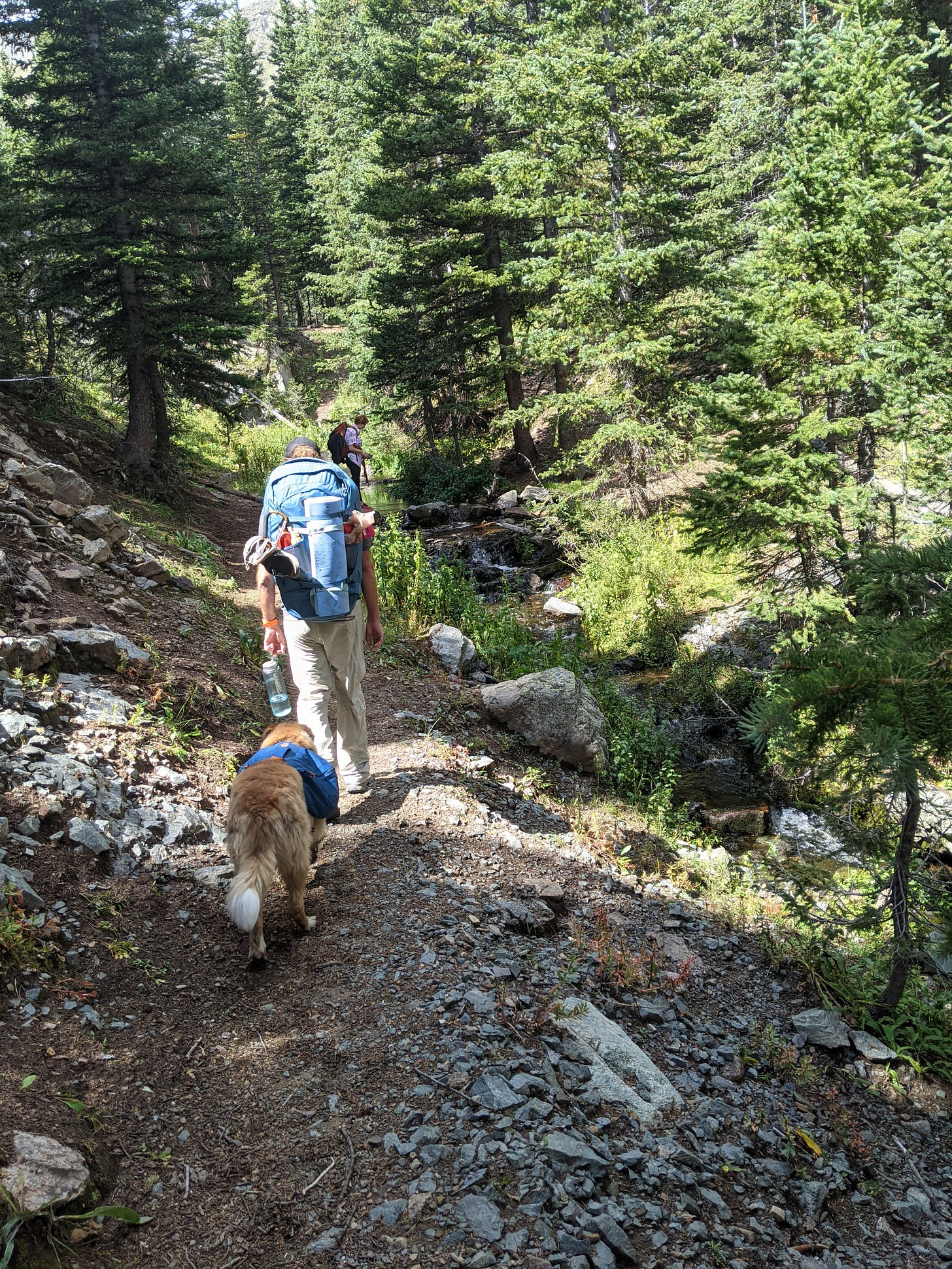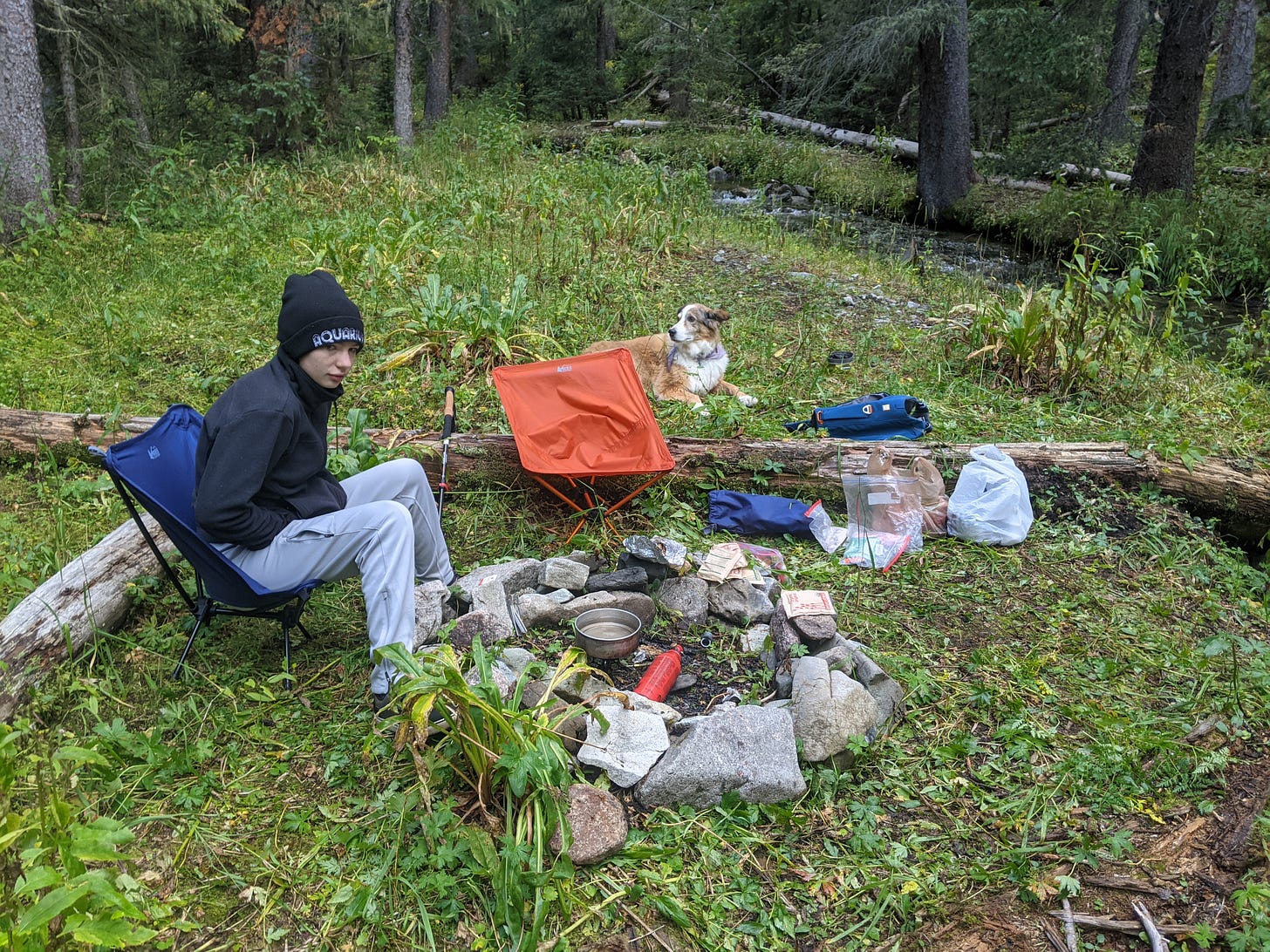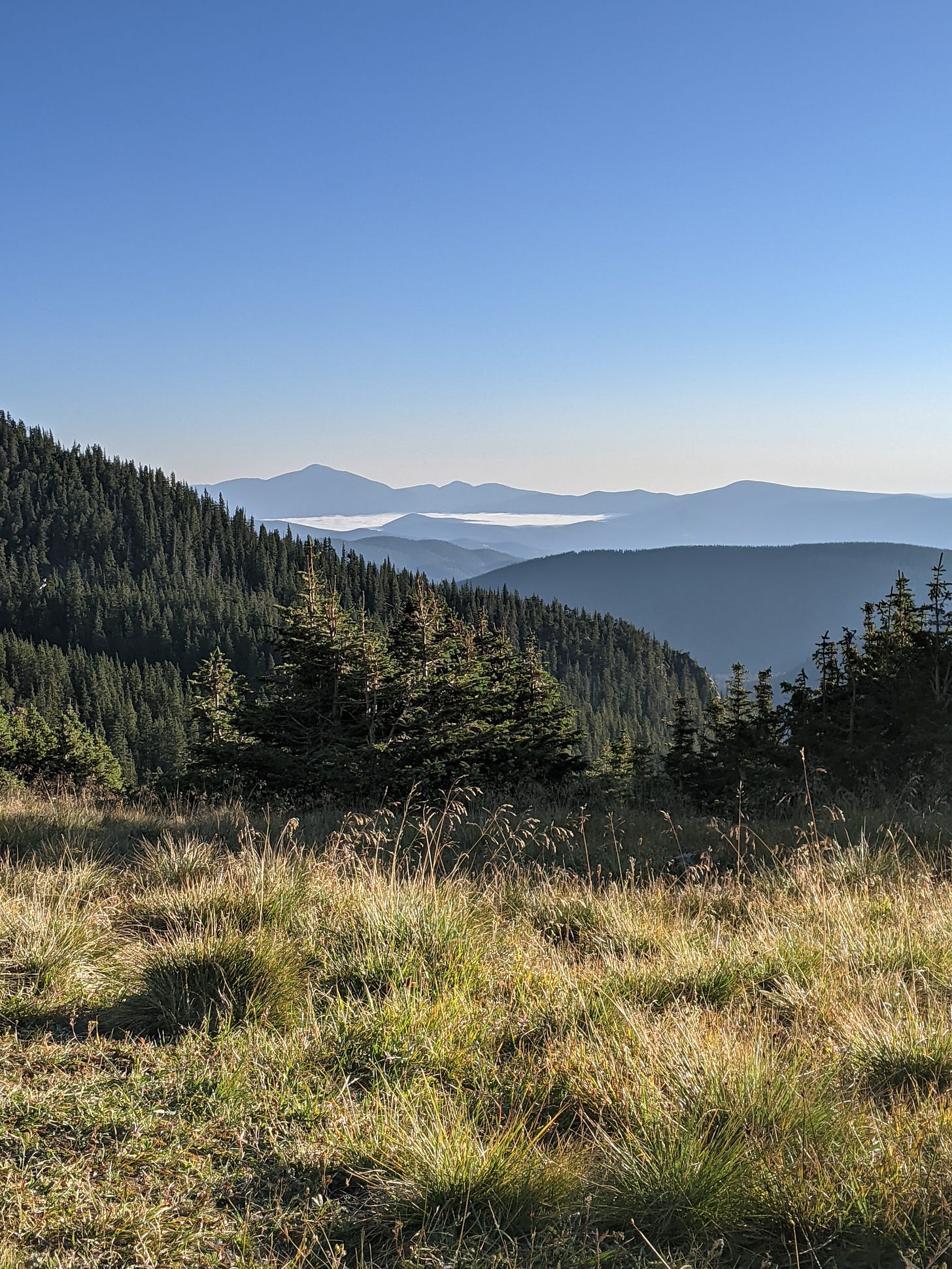Backpacking the Wheeler Peak Wilderness
At Nature's Pace
We started late for this trip thanks to hours of packing. The thing about backpacking is the packing. It takes a long time to pack up all your stuff, especially a family of three. We’re fairly organized--everyone has one pad, one sleeping bag and one stuff sack. We divide up the tent. Then, there’s the cookstove, one bowl, one cup and one spork per person and a pot. Our water purifier and food. Stuff sacks have an extra set of clothes and warm layers, a toothbrush. Then the reading and writing materials of course, plus headlamps. Camp shoes, toilet paper and trash bags. Sunscreen, raincoats, hats, first aid kit. The dog carries her own dog food, pills, leash and bowl. What am I forgetting? Phew. Pretty soon simple gets complicated.
The funniest part is right before bed when we have to collect all things scented-- food, dog food, toothpaste, trash, sunscreen, deodorant, etc. and round them up into a bag and pulley them into a tree so animals, especially bears, won't be attracted to our tent or eat all our food. Inevitably something is forgotten. The next day, pack it all up again but it never quite fits back in the pack in the same way, does it?
Due to our late departure, we stopped early to set up camp. It doesn’t matter how far we get. It’s irrelevant actually. As long as we have a flat piece of ground and a water source. Well, one out of two isn’t bad as we ended up tilting to the corner throughout the night.
It’s tempting to try to clock miles or bag peaks, but it’s also the entirely wrong attitude. Those are capitalist ideals wrapped up in ambition, success and achievement. Mother Nature doesn’t care at all for those concepts. Our goal was to camp early enough that we had time before dark to enjoy dinner and setup camp. Our goal was to go off grid from Internet, to be together, to enjoy the pace of nature.
Even though our teen had a meltdown, refusing to go the night before, I didn’t feel one bit of parental guilt for forcing her to. As I told her, I am confident that once you start moving and get out into the forest, everything will feel better and getting away from the constant online connection to peers will give you some healthy distance.
Eventually we settled into the twilight time when it’s not quite dark but the night is quickly approaching and we talk around the campfire. No phones, TV, computer or Internet to interject. Just a creek rolling past and mosquitoes going in for the kill.
It’s a grace really, to be in a tent beside the rolling river, our headlamps illuminating our books. A simple grace that the sun wakes us, the wind cools us, the water feeds us.
The next day tired from restless sleep— not anxious or vigilant fortunately, but unaccustomed to the hard solid mat below me— an upward climb to an alpine lake. In September, the wildflowers are mostly gone, some white daisies and mountain asters, a dabble of bluebells and western gentian, the dried husks of wild celery and the red queen’s crown.
After climbing over scree and across a meadow at timberline, we arrived at the horseshoe shaped lake circled by high peaks in mid-afternoon. We promptly ate lunch. Then, I rolled out a mat and fell asleep. The sweat of my clothes now causing me to feel chill in the mountain wind, I snuggled into my raincoat.
Friends arrived soon after and we scouted the perfect campsite with lake views on one side and mountain views on the other, seeing clear to the Valle Vidal. We watched as hikers traversed the ridgeline of the towering mountain tops above. A popular trail on the other side of the wilderness area from us leads to the highest mountain in New Mexico. We will not be joining them. We do not need to peak anything; on our side of the mountain range, we saw only a handful of campers on the busy Labor Day weekend.
All day I consider how it feels to be in nature for 24 hours and then 48 hours. How does it alter my nervous system? My key word these days is restorative. I know it’s what I need to stay full of my own peaceful energy and keep my nervous system soothed.
In our culture, this is a topic for trending listicles, not taken seriously. The term self-care is thrown around like other wellness catch phrases— stress reduction, relaxation, mindfulness, etc. It’s not actually taken seriously because it goes against deeply ingrained cultural norms— to work hard at all costs. Self-care is considered something secondary you do, like a hobby, weekend or vacation. Work always comes first and is the primary objective. Mainly because our value system is built around making money. One may argue that we need money to survive, but we don’t. We need food, water, fresh air and shelter to survive, not money. Money is a means of exchange for these things, yes, but it is not the only way and it is merely that, an exchange. It has no value in and of itself. And yet we treat it as if it has more value than those things that actually do such as, healthy soil, trees for oxygen, clean water. This is all to say that our priorities are messed up.
When I talk about restorative practices or self-care, I mean a lifestyle choice, a daily integral practice of doing things to bring my nervous system back into alignment. I want my parasympathetic nervous system— the rest and digest system- to be on and my sympathetic nervous system- the flight or fight system- to be off unless needed. This unfortunately is not the case in our high stress world of gaining, doing, achieving, competing, producing, etc.— all things necessary to keep the economic machine humming.
While camping, I didn’t take time to sit on a mat and meditate, I practiced minimal yoga to stretch out the kinks and I only stole a few minutes to write, all my usual self-care practices. Mainly, I chatted with friends and family and enjoyed the scenery. I hauled water and wood, cooked meals and ate them. I didn’t need to create restorative practices while in nature sleeping on the earth. Nature is restorative in and of itself.
An hour in nature is great. 24 hours is a full absorption of the natural pace, the slow infinite movement of the sun appearing and disappearing. It is the time of birds flying overhead and two coyotes yapping about our intrusive presence. After 48 hours, the moon appearing and disappearing, appearing and disappearing, we are going with the flow, taking it all in— the water from the lake for our coffee, the shade of a tree, the buzz of bees attracted to sunscreen, the smoke from our campfire circling every which way as the wind funnels to and fro bouncing off rock walls and river canyons.
My breath the breeze, My body the lake. My inspiration the fire. My feet the earth.
The second night, I slept much better, exhausted as I was from the first night. I was the first to awaken just in time for the sun to rise over the nearest knoll and dry my camping chair. An icy dew coated the inside of our tent fly.
I was a little sad it was time to pack up and return home to Internet and to-do lists and TV to distract my teen. I wished for another day or two of dehydrated meals, restless sleep and a body odor filled tent.
The conversations we have in the forest with our children are monumental and can exist in no other space but the wilderness away from all the fears of society circling us at every moment— fear of time, age, loss. The forest tells a very different story— abundance, resilience, death and rebirth.
I imagine it’s all nonsense until you experience it for yourself. I give thanks to Mother Earth for the solace she provides. I never feel I’ve done enough and pray my presence will make it so.










